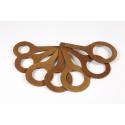Apple gauge
Collection:David Usborne Collection
Classification(s):
Food
Agriculture
Agriculture
Medium: Wood
Object number: DU_816
DescriptionPlywood apple gauge, used to measure the size of apples intended for supermarket retail.
ProvenanceThis object, part of The David Usborne Collection, was donated to University of the Arts London on 22nd June 2015 by private collector David Usborne. David has been a collector of tools for over 30 years and previously worked as a teacher of design at the Central School of Art & Crafts, now Central Saint Martins.
The collection comprises examples of twentieth century tools, from a broad range of disciplines. The objects chosen are based on David’s self-imposed criteria. Primarily the collection contains utilitarian objects, where the particular task or function performed by each object may be unfamiliar or unknown. Material was acquired based on an object’s resonance, David may see the form of an object as a figurative reminder of something else, for example an animal or person. Objects were sourced based on their relative unimportance, as a collector David favours functional and anonymous design over decorative or artistic objects.
Often inexpensive, material was originally purchased from car boot sales, auctions and second-hand shops.
The collection is currently stored at the Archives & Special Collections Centre, London College of Communication. However part of the collection remains in David’s possession at his homes in London and Lisbon. David no longer actively collects, but he does make infrequent purchases.
At the time of donation David provided rudimentary cataloguing data, detailing object attributions (if known) and place and method of acquisition.
David published a book in 2010 ‘Objectivity: a designer’s book of curious tools’. The book illustrates objects in the collection and features a forward by British designer Thomas Heatherwick. Publisher Thames & Hudson introduced a classification system based on function. Each of the nine chapters represent a different classification term including: hitting, cutting, gripping, holding, rubbing, shielding, moulding, spreading and testing. Photographer Celine Marchbank produced object photography for the book. Celine’s same images are used by University of the Arts London within The Museum System database.
David created an associated website for the collection, www.object-ivity.com. The website features a gallery of object images which can be sorted according to function, context or metaphor. The website encourages the visitor to guess the identity of each object, before revealing a caption. The website notes that the attributions within the captions are David’s best guess only.
This object was previously on long-term loan to Heatherwick Studio, it was returned to University of the Arts London in Autumn 2018.
The collection comprises examples of twentieth century tools, from a broad range of disciplines. The objects chosen are based on David’s self-imposed criteria. Primarily the collection contains utilitarian objects, where the particular task or function performed by each object may be unfamiliar or unknown. Material was acquired based on an object’s resonance, David may see the form of an object as a figurative reminder of something else, for example an animal or person. Objects were sourced based on their relative unimportance, as a collector David favours functional and anonymous design over decorative or artistic objects.
Often inexpensive, material was originally purchased from car boot sales, auctions and second-hand shops.
The collection is currently stored at the Archives & Special Collections Centre, London College of Communication. However part of the collection remains in David’s possession at his homes in London and Lisbon. David no longer actively collects, but he does make infrequent purchases.
At the time of donation David provided rudimentary cataloguing data, detailing object attributions (if known) and place and method of acquisition.
David published a book in 2010 ‘Objectivity: a designer’s book of curious tools’. The book illustrates objects in the collection and features a forward by British designer Thomas Heatherwick. Publisher Thames & Hudson introduced a classification system based on function. Each of the nine chapters represent a different classification term including: hitting, cutting, gripping, holding, rubbing, shielding, moulding, spreading and testing. Photographer Celine Marchbank produced object photography for the book. Celine’s same images are used by University of the Arts London within The Museum System database.
David created an associated website for the collection, www.object-ivity.com. The website features a gallery of object images which can be sorted according to function, context or metaphor. The website encourages the visitor to guess the identity of each object, before revealing a caption. The website notes that the attributions within the captions are David’s best guess only.
This object was previously on long-term loan to Heatherwick Studio, it was returned to University of the Arts London in Autumn 2018.
Published References
Objectivity: A designer's book of curious tools, David Usborne, Thames & Hudson, 2010
http://object-ivity.com/




